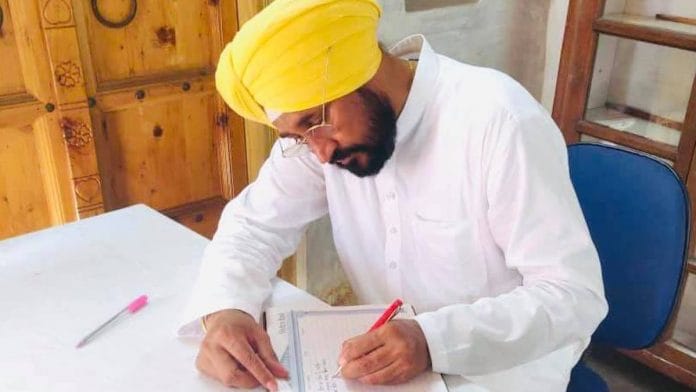How does an old English language nursery rhyme get quoted in feminist movements around the world and is also relevant to the elevation of Charanjit Singh Channi in Punjab and Dinesh Khatik, Paltu Ram and Sanjay Gond in Yogi Adityanath’s Uttar Pradesh?
“When she came there, the cupboard was bare…” is the most quoted line from Old Mother Hubbard in global feminist movements. It refers to the phenomenon of how positions are finally offered to women when those chairs are robbed of power in an institution. In popular slang, it would be called ‘bread-crumbing’. In the past two weeks, the two political events in Congress and the Bharatiya Janata Party (BJP) brought back this central dilemma of the diversity agenda.
The Congress party chose Charanjit Singh Channi, a Dalit Sikh, to replace Captain Amarinder Singh as the Punjab chief minister. This it did when surveys began to show a slide in popularity and electability of the Captain. And on Sunday, CM Yogi Adityanath, after presiding over a largely dominant caste council of ministers, decided to remember caste diversity by including two Dalits, one tribal and three OBC members. This, at a time, when people are beginning to worry about the fallout of Covid second wave mismanagement on the upcoming Uttar Pradesh election.
When in doubt, and faced with a slide, run for diversity optics.
But in India, from V. P. Singh’s Mandal Commission for OBC reservations to Adityanath’s recent cabinet expansion to the appointment of Mallikarjun Kharge as Congress leader of opposition, you can find this template of diversity at play quite frequently. When the chair’s power begins to erode or when it is beleaguered, that’s when you send the historically unrepresented.
Also read: Picking Channi as Punjab CM has restored political canniness back into Congress game
Repeat offenders in politics
The Congress has been a repeat offender in this twisted template of performative diversity. Perhaps because they have been in power for so long. The tallest Dalit leader Congress has produced was Jagjivan Ram, decades ago.
Only when the Congress party was reduced to a historic low of 44 seats in Parliament in 2014 was Kharge picked to be the leader of opposition in the Lok Sabha. A stronger Congress opposition in the past had never done this. In the 2009 Lok Sabha election, when the Congress managed to win 21 seats in Uttar Pradesh, they elevated UP Brahmin leaders such as Jitin Prasada and Rajiv Shukla, and made them ministers. But a weakened Congress in 2019, with one seat, picked a leader from a backward community, Ajay Kumar Lallu, to be the UP Congress chief. Another glaring example is of the Congress party appointing Sushil Kumar Shinde as the chief minister of Maharashtra in 2003, months before the state election where it feared facing anti-incumbency. Within a few months of Shinde’s taking over, the model code of conduct came into place, leaving him with very little power. What was especially cynical is that Shinde was replaced by Vilasrao Deshmukh after the election.
Women know this too well, the phenomenon is called ‘glass cliff‘.
There are other examples.
Facing sting operation charges in 2001, the BJP quickly sacrificed its only Dalit president Bangaru Laxman; but it later retained Dilip Singh Judeo, a Thakur leader, also caught taking bribes. Today, no Indian state has a Dalit chief minister, except Punjab. Even that was partially undone when Congress announced that the elections will be fought under the leadership of both CM Channi and Navjot Singh Sidhu. Of course, India has a Dalit President Ramnath Kovind, just like K.R. Narayanan previously – in a non-executive, titular position.
Similarly, V.P. Singh woke up to the Mandal commission only after Devi Lal quit, leaving his government shaky.
Also read: Yogi expands his Cabinet, but still keeps SC/STs away from real power
Does diversity revolution pay?
Cynical as it may be, is this really a practice with no dividend? The bare cupboard metaphor actually gained currency among feminists because of the experience of elected women in the Nordic countries (Norway, Sweden, Finland). When they were elected, they found that the power had moved away from the legislature to what theorists called the new triangles of power — nationalism, conservatism and neoliberalism. Mere representation in legislatures wasn’t enough. Women had to gain power in national security and financial institutions. Over time, critical momentum was built. Today, women are the prime ministers of Norway, Finland and Iceland.
Social change can come in two ways — revolutionary and evolutionary. The former is disruptive and requires political, social and cultural courage in addition to vision. It entails an act of stepping aside by entrenched caste members. The latter involves slow, incremental steps of what may seem to be empty symbolic acts. That’s been called performative diversity.
That’s one thing Canadian feminist scholar Jill Vickers taught me about representation: You take what you get and build on it.
So, even a bare-cupboard Channi move is important for social justice goals, as is Gond in the Uttar Pradesh government. That political parties find themselves forced to enact this diversity dance is itself a huge leap from the Nehruvian group of leaders who set upon the nation-building project in the 1950s and ’60s with a brazen and largely upper-caste line-up. It is an admission of a new language that has simmered under the surface for long and can no longer be ignored. American sociologist Erving Goffman would have given a nod to this need to practise the ‘art of impression management’.
But it really depends on how well leaders like Channi, Khatik, Ram and Gond use the new chair to transform their moment in history, even if it may look like they are being set up for failure. Or be known as the ones who held a besieged fort temporarily.
Rama Lakshmi is Opinion and Features Editor at ThePrint. She tweets @RamaNewDelhi. Views are personal.






